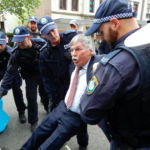What are the Powers of Citizens’ Arrest in New South Wales?

The actions of two Perth men, who have been dubbed the ‘Perth Pedo Hunters’, have put a 61-year-old man behind bars, after the men posed as a fictitious 14-year old boy named ‘Jarrod’, engaged in sexualised conversations with the alleged sexual predator and met him in a park, before performing a citizens’ arrest upon him – which was allegedly captured on camera.
What is a citizens’ arrest?
There are state and territory laws across the nation which empower persons other than a police officers to arrest a person in certain limited situations.
These powers are colloquially known as ‘citizens arrest’.
In New South Wales, the power is contained in section 100 of the Law Enforcement (Powers and Responsibilities) Act 2002.
“(1) A person (other than a police officer) may, without a warrant, arrest a person if:
(a) the person is in the act of committing an offence under any Act or statutory instrument, or
(b) the person has just committed any such offence, or
(c) the person has committed a serious indictable offence for which the person has not been tried.
(2) A person who arrests another person under this section must, as soon as is reasonably practicable, take the person, and any property found on the person, before an authorised officer to be dealt with according to law.”
The ’Perth Pedo Hunters’
The so-called ‘Perth Pedo Hunters ‘ provided evidence to police of sexualised conversations they had under the name of ‘Jarrod’ with the 61-year old alleged predatory.
Despite ‘Jarrod’ telling the man he was underaged twice, the man allegedly continued a sexually explicit conversation, saying he didn’t care about the boy’s aged, and attempted to arrange a meeting at a local park.
This was enough for Police to take the man into custody. Police have since seized the 61-year old man’s phone, raided his home, and charged him with intent to procure a person believed to be under 16 years for sexual activity. He has been refused bail.
While Police don’t encourage ‘vigilante’ behaviour or citizen’s arrests because people can unwittingly put themselves in danger, the Pedo Hunters remain undeterred and say they have a successful track record in identifying adults who want to prey on innocent children and teens.
The men say that within five minutes of creating the fake profile last week, they received 30 messages from adult men in Perth asking for sexual encounters with ‘Jarrod.’
Online predators are on the rise
Figures released earlier this year showed that online child exploitation has soared over the past decade, from 1,000 reported cases in 2009 to 17,000 reported cases in 2019.
And many parents remain oblivious to the dangers their children face when they’re on the internet.
The survey, undertaken by the Australian Centre to Counter Child Exploitation, a specialist federal government agency set up in 2018, shows that online predators are no longer just using social media and dating apps to contact children but are infiltrating the gaming space, pretending to be like-minded gaming enthusiasts.
And Federal Police say they’re also noticing new trends, such as predators using a ‘scattergun approach’ targeting dozens of children at a time in the hope they will attract a few, which dispels long-held perceptions that perpetrators have tended to carefully identify their victims and then spent time grooming them.
The demographic of offenders is also changing, with an increasing number of women, and also people in the younger 18-24 year old age bracket targeting kids for the purpose of sexual activities.
Parents have a responsibility to keep their children safe
While more needs to be done to educate children, and most schools include regular cyber safety sessions in the curriculum, the onus lies with parents to ensure they are supervising what their children are doing online and who they are interacting with.
While for some parents there’s a fine line between ‘checking up’ on activity and respecting a teen’s privacy, the simple fact of the matter is that complacency puts kids at risk.
And these days, teens are not the only ones with technology. Many younger children have regular access to phones, Ipads, and internet-connected games like Playstation and Xbox too.
Many apps and games used by young people for messaging, gaming and socialising don’t have safety and security settings switched on by default – these need to be adjusted in settings and updated regularly.
And while Xbox and Playstation allow multiple players to talk to each other and interact, it’s important that parents know who is on the other end. The fact of the matter is, it could be anyone. Only a few years ago a Queensland man was caught impersonating pop star Justin Bieber in several fake social media accounts, to lure young women.
Keeping kids safe online
Parents must continue to warn children of the ‘stranger danger’ that exists in cyberspace, and do all they can to make sure that the people their children are engaging with are real, and are not making sexual demands or threats.
Of course, this is much easier said than done, so the experts suggest that parents regularly engage with their kids in their online activities – to get to know the games, get involved and play or simply observe, from time to time.
Children should also be taught to:
- Use a nickname or their first name only, never their full name.
- Never disclose personal information, such as address, phone number, the name of the school they attend, or the sports clubs they play for.
- Be selective about the photos they share – and ensure that nothing in the photo could be an identifier (such as a school uniform or a street name, park or playground name).
- Consider turning off GPS functions which can automatically provide the location details of where a photo was taken.
- Never meet an online friend for the first time in person without parents or another trusted adult present.
If you suspect an online predator might be targeting your child
Police say that if you notice any suspicious activity, it’s better not to delete conversations or block the suspected predator, but to disengage and contact them immediately.
They say their job is easier if the suspect is unaware Police have been contacted, and if profiles and chat history is left intact.








